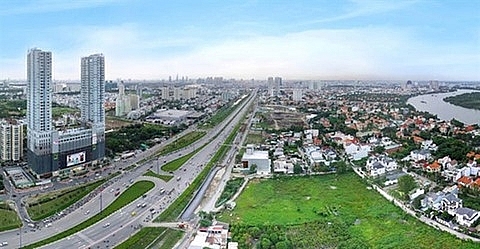State dials up reforms of property market rules
The Ministry of Construction will prioritise completion of the reforms.
Nguyen Manh Khoi, deputy director of the Ministry of Construction’s Department of Housing Management and Real Estate Market, said this at a seminar on property business held by the Vneconomy newspaper and the Viet Nam Chamber of Commerce and Industry earlier this week.
The ministry is planning to submit a draft resolution on reforming administrative procedures to the Government in the second quarter of this year, Khoi said.
In the draft resolution, it’s expected to create more favourable conditions for economic sectors, especially foreign-invested businesses, investment and business activities in the local property market by amending the Housing Law and Real Estate Business Law.
The ministry will complete specific information on the local property market and identify problems in business activities, along with finding measures to solve them, Khoi said.
However, Le Hoang Chau, chairman of the HCM City Real Estate Association, said the State should amend the Land Law, regulations on land use rights for lands of tourism resorts, Investment Law, Enterprise Law and Bidding Law to have a transparent competitive environment.
He said real estate investors should be most concerned about the risk of supply and demand.
Earlier, Minister of Construction Pham Hong Ha said in 2018, the ministry would implement a project on assessing the situation, forecasting trends and proposing market solutions and management policies to promote a stable and healthy development of the real estate market, according to baodautu.vn.
This is an important database to follow developments in the property market, propose solutions to promote those developments and enhance inspection and supervision to implement laws on housing and real estate market, Ha said.
The ministry will regularly engage in dialogues with associations and businesses to deal timely with feedback and proposals of enterprises and the public.
Nguyen Tran Nam, chairman of the Viet Nam Real Estate Association (VNREA), said the domestic real estate market has had a stable and healthy development.
In 2017, the number of real estate transactions increased sharply against 2016. Ha Noi and HCM City had 64,263 successful transactions, mainly including affordable and mid-level apartments, Nam said.
Property prices were generally stable. The price rose by five per cent for apartment and 10 per cent for land. Meanwhile, the inventory of property products in 2017 continued to decline by 17 per cent year-on-year.
In a survey jointly conducted by VNREA and its Thai partners, it shows that commercial housing projects have been consumed within six months, an expected duration in Southeast Asian countries.
Nam said credit in the real estate sector continued to grow in safe limits. By the end of 2017, outstanding real estate loans accounted for some 8 per cent of total outstanding loans. Under the direction of the Government, credit for the real estate sector has had a safe development, and more foreign investment has flown to this sector.
According to Nam, State Bank of Viet Nam this year should apply a more active and flexible credit mechanism for the real estate market.
At the same time, the State should adopt policies to promote the development of social and commercial houses as well as create conditions for the development of other sectors.
VNREA has also urged the Government to come up with solutions to the existing problems of the property market, including land fund for social houses and cheap commercial houses, as well as regulations for new kinds of real estate, such as condotel, officetel and village resorts. These solutions are expected to create favourable conditions for an impressive growth of the property market this year, Nam said.
Source: VIR



